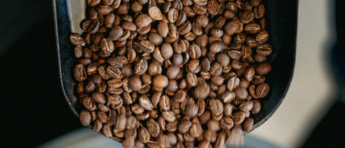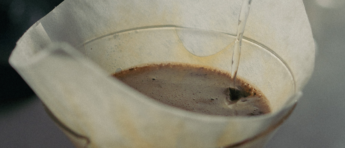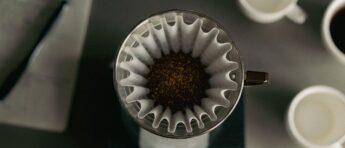What Is Decaf Coffee?
- March 18, 2023
Decaf coffee isn’t caffeine-free. Are you surprised?
Although many people think decaffeinated means caffeine-free, it really refers to the process coffee goes through to remove most of its caffeine.
Whether you only brew in the morning or can drink a steady stream of coffee all day, sometimes, you want the burst of flavor without the buzz.
Some people prefer decaffeinated coffee because it helps them stay more balanced throughout the day; others choose it because they are not able to consume caffeine for health reasons. Whatever the case may be, there’s no doubt decaf can be just as delicious as its fully caffeinated counterpart.
You may have noticed decaffeinated coffee options emerging more lately, on the menu at your favorite coffee shop, or in the coffee aisle at your grocery store. In this post, we’ll teach you some interesting decaf coffee history, and look closer at the most common decaf methods.
The Difference Between Regular Coffee and Decaf
Many are curious about the question, “Is coffee naturally caffeinated?”, and the answer is yes. Caffeine is naturally present in the flowering coffee plant, its leaves, and beans.
Many people enjoy caffeinated coffee because it helps them increase their energy levels without relying on overly-processed energy drinks or sugary sodas. There are also many documented health benefits of drinking coffee, including a lower risk of developing Type 2 diabetes, heart disease, and depression.
Decaffeinated coffee, on the other hand, is coffee that has gone through a decaffeination process to remove around 97% of its caffeine.
How much caffeine is in decaf coffee?
A standard 8-ounce cup of decaf coffee contains around 2 mg of caffeine, though some may have up to 15 mg. In comparison, an 8-ounce cup of normal coffee has anywhere from 80 to 100 mg of caffeine.
Is there anything else ‘removed’ in the decaffeination process?
There are many decaf methods that can alter the coffee in various ways; the primary goal is to always remove most of the caffeine content and nothing else. Unfortunately, certain methods also strip the coffee of some of its flavor.
However, for the most part, decaffeinated coffee is just as good as regular coffee, particularly when it comes to our specialty grade coffee we source.
Does decaf taste different from regular coffee?
No, not really. Even a skilled barista will likely not be able to taste the difference between a regular cup of joe and a high-quality decaffeinated coffee. One thing you may notice is that decaf coffee can have a slightly more sour taste than regular coffee. This comes from the way the beans are processed, not any of the chemicals in decaf coffee.
How can you tell coffee is decaf?
The only way to know for sure if coffee is decaf is to check its packaging. Otherwise, you will likely not be able to tell through taste alone.
Is decaf healthy?
If you drink coffee for its health benefits, then you won’t miss out by switching to decaf. Decaf coffee is rich in antioxidants, and includes small doses of nutrients like vitamin B3, magnesium, and potassium.
The stimulating effects of regular coffee are why most people prefer it over decaf. However, from a health standpoint, you may stand to gain more sometimes by opting for less caffeine throughout the day.
How was decaf coffee invented?
Like many of the world’s greatest inventions, decaf coffee was first made by accident. In 1905, a German coffee merchant named Ludwig Roselius received a package of beans that had been soaked in seawater. Rather than throw them away, he decided to roast them and try their brew. It turned out they were still pretty good, they just didn’t have the typical kick of regular coffee.
It turns out Ludwig was such a fan of the decaffeinated blend that he wanted to recreate it. As you can imagine, drenching the beans in seawater left an unpleasant salty aftertaste. So, the merchant decided to use a chemical called benzene to strip the caffeine away instead.
We know that people in the past were far more ill-informed about potential dangers of chemical use than we are today. Benzene was typically used in aftershave and paint strippers, and it can cause the cells to not function properly, and potentially cause cancer. Thankfully, we’ve discovered much safer methods for stripping caffeine out of coffee beans.
As time went on, people discovered more decaffeination methods, bringing us to the many options we have today.
How is decaf coffee made?
Swiss Water Method
Invented in 1970, the Swiss Water Method involves extracting caffeine from green coffee beans by soaking them in water. The caffeine is extracted with carbon, and a new batch of beans is soaked in the decaffeinated liquid.
The method says that as the liquid and beans come together, the beans seek equilibrium between their caffeine and the water they’re submerged in. This process persists until the beans are nearly caffeine-free.
Carbon Dioxide
Pumping carbon dioxide (C02) through a batch of coffee beans can cause their chemical compounds to separate, thus removing the majority of caffeine.
Methylene Chloride
Remember how benzene used to be the go-to chemical for decaffeination? Methylene chloride is its successor. The method is the same — directly apply the solvent to the beans to strip their caffeine. However, some people have raised concerns about chemicals in decaf coffee, as methylene chloride has been found to potentially cause nervous system damage.
However, the FDA says that the legally permitted trace amounts found in decaf do not pose any health risks to consumers.
Ethyl Acetate
Ethyl acetate, also referred to as the ‘Sugar Cane’ decaf method due to where the ethyl acetate comes from, is a distillate of the leftover organic material from the sugar cane after it’s processed into sugar. Ethyl Acetate is a natural solvent that’s used in many products, including decaf coffee, varnishes, and cleaning mixtures. It’s not dangerous to humans in trace amounts, so the FDA approves it for use in decaffeination.
At Servant Coffee we typically offer Mustafá Decaf from Colombia which uses this method. It involves soaking the beans in water and steaming them to expand their cells; then, they’re soaked and washed in the solvent to remove their caffeine. Then the coffee is rinsed to remove any chemicals and packaged for shipping.
Pros and Cons of Decaf Coffee
Pros:
- Reduced caffeine for people who are sensitive to its effects
- Lower acidity than regular coffee
Cons:
- Depending on the process, it can include trace amounts of chemicals
- Different decaffeinating processes can affect the flavor of the coffee differently
Should you drink decaf?
By all means, enjoy a cup of decaf coffee whenever it suits your fancy. You may decide to try it if you’re trying to drink less caffeine, or you want to drink some more coffee in the afternoon without the full buzz of a regular cup of joe.
You can also drink decaf if you’re caffeine-sensitive. However, if you’re taking any medications that could interact with caffeine, it’s important to ask your doctor before drinking decaf.
Final Thoughts
Instead of seeing decaf as caffeine-free, it’s more accurate to think of it as coffee with far less caffeine. While iIt still has many of the same health benefits of regular coffee, too much caffeine can cause sleep disturbances, emotional imbalances, and other issues. If you want to counteract some of the side effects of drinking caffeine, decaf is a great alternative.


